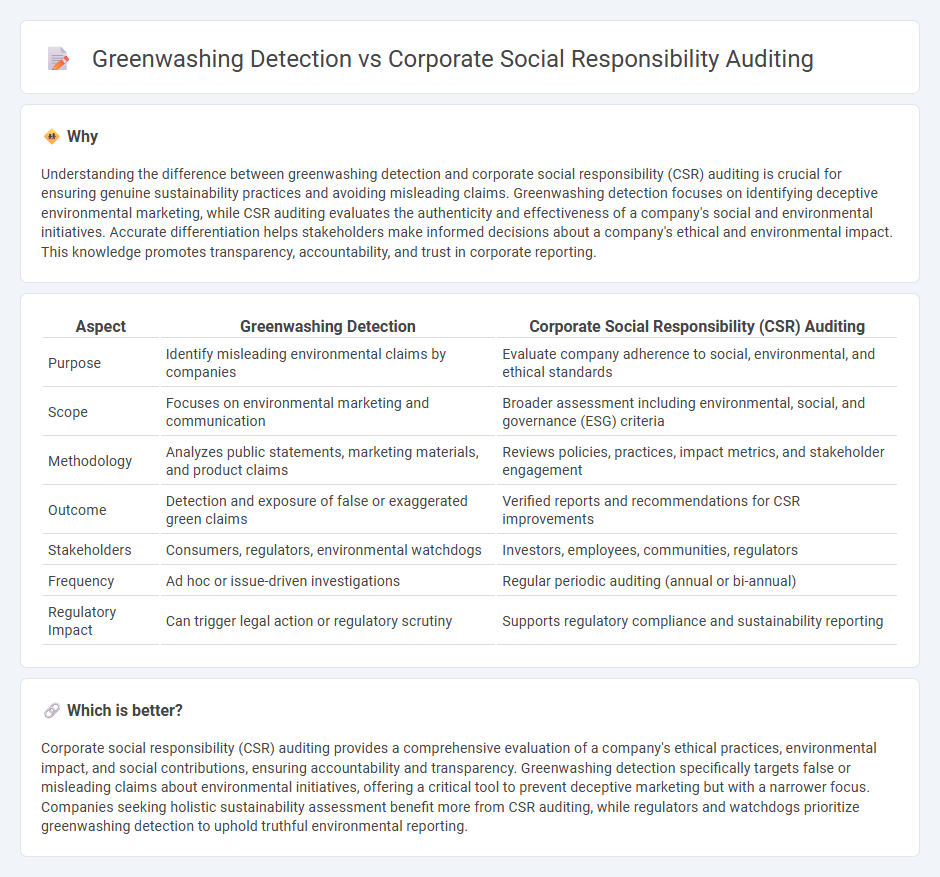
Greenwashing detection involves identifying misleading claims companies make to appear environmentally responsible without genuine sustainable practices, while corporate social responsibility (CSR) auditing assesses the authenticity and impact of a company's social and environmental initiatives. Advanced data analytics, stakeholder reporting, and regulatory compliance play key roles in differentiating true CSR efforts from superficial greenwashing. Discover how innovative accounting techniques enhance transparency and accountability in environmental and social governance.
Why it is important
Understanding the difference between greenwashing detection and corporate social responsibility (CSR) auditing is crucial for ensuring genuine sustainability practices and avoiding misleading claims. Greenwashing detection focuses on identifying deceptive environmental marketing, while CSR auditing evaluates the authenticity and effectiveness of a company's social and environmental initiatives. Accurate differentiation helps stakeholders make informed decisions about a company's ethical and environmental impact. This knowledge promotes transparency, accountability, and trust in corporate reporting.
Comparison Table
| Aspect | Greenwashing Detection | Corporate Social Responsibility (CSR) Auditing |
|---|---|---|
| Purpose | Identify misleading environmental claims by companies | Evaluate company adherence to social, environmental, and ethical standards |
| Scope | Focuses on environmental marketing and communication | Broader assessment including environmental, social, and governance (ESG) criteria |
| Methodology | Analyzes public statements, marketing materials, and product claims | Reviews policies, practices, impact metrics, and stakeholder engagement |
| Outcome | Detection and exposure of false or exaggerated green claims | Verified reports and recommendations for CSR improvements |
| Stakeholders | Consumers, regulators, environmental watchdogs | Investors, employees, communities, regulators |
| Frequency | Ad hoc or issue-driven investigations | Regular periodic auditing (annual or bi-annual) |
| Regulatory Impact | Can trigger legal action or regulatory scrutiny | Supports regulatory compliance and sustainability reporting |
Which is better?
Corporate social responsibility (CSR) auditing provides a comprehensive evaluation of a company's ethical practices, environmental impact, and social contributions, ensuring accountability and transparency. Greenwashing detection specifically targets false or misleading claims about environmental initiatives, offering a critical tool to prevent deceptive marketing but with a narrower focus. Companies seeking holistic sustainability assessment benefit more from CSR auditing, while regulators and watchdogs prioritize greenwashing detection to uphold truthful environmental reporting.
Connection
Greenwashing detection and corporate social responsibility (CSR) auditing are intrinsically linked through their focus on verifying the authenticity of a company's environmental and social claims. CSR auditing provides structured assessments of a company's adherence to ethical standards, which helps identify discrepancies indicative of greenwashing practices. Accurate detection of greenwashing relies on rigorous CSR audits to ensure transparency and accountability in corporate sustainability reporting.
Key Terms
Sustainability Reporting
Corporate social responsibility (CSR) auditing rigorously examines a company's sustainability reporting to verify the accuracy and transparency of environmental, social, and governance (ESG) claims, ensuring compliance with global standards such as GRI and SASB. Greenwashing detection targets misleading or exaggerated CSR disclosures, aiming to protect stakeholders from deceptive sustainability practices through advanced analytical tools and third-party verification. Explore how integrating CSR audits with greenwashing detection enhances the credibility of sustainability reports and drives genuine corporate accountability.
Assurance Standards
Corporate social responsibility (CSR) auditing relies on established assurance standards such as ISAE 3000 and AA1000AS to evaluate the accuracy and completeness of a company's sustainability disclosures, ensuring stakeholder trust and regulatory compliance. In contrast, greenwashing detection focuses on identifying misleading environmental claims by analyzing inconsistencies in CSR reports and public communications, often requiring specialized forensic techniques beyond traditional assurance frameworks. Explore the latest methodologies and tools to enhance the integrity of CSR practices and combat greenwashing effectively.
Environmental Performance Indicators
Corporate social responsibility auditing rigorously evaluates Environmental Performance Indicators (EPIs) such as carbon emissions, waste management, and resource efficiency to ensure accurate reporting and genuine sustainability efforts. Greenwashing detection analyzes discrepancies in environmental claims and verifies authenticity through data-driven assessments to identify misleading practices. Explore how advanced auditing techniques and greenwashing tools can enhance transparency and trust in corporate environmental accountability.
Source and External Links
ROLE FOR AUDITING IN CORPORATE SOCIAL RESPONSIBILITY - This paper discusses the role of auditing in Corporate Social Responsibility (CSR) and corporate governance, highlighting its importance in building trust between corporations and stakeholders.
What is a Social Audit and Why Are They Important? - Social audits assess an organisation's social and ethical practices, helping businesses demonstrate transparency and accountability in their operations and supply chains.
Social Responsibility Audits - NSF offers social responsibility audits to help businesses implement sustainable practices and manage supply chain risks through schemes like SMETA.
 dowidth.com
dowidth.com